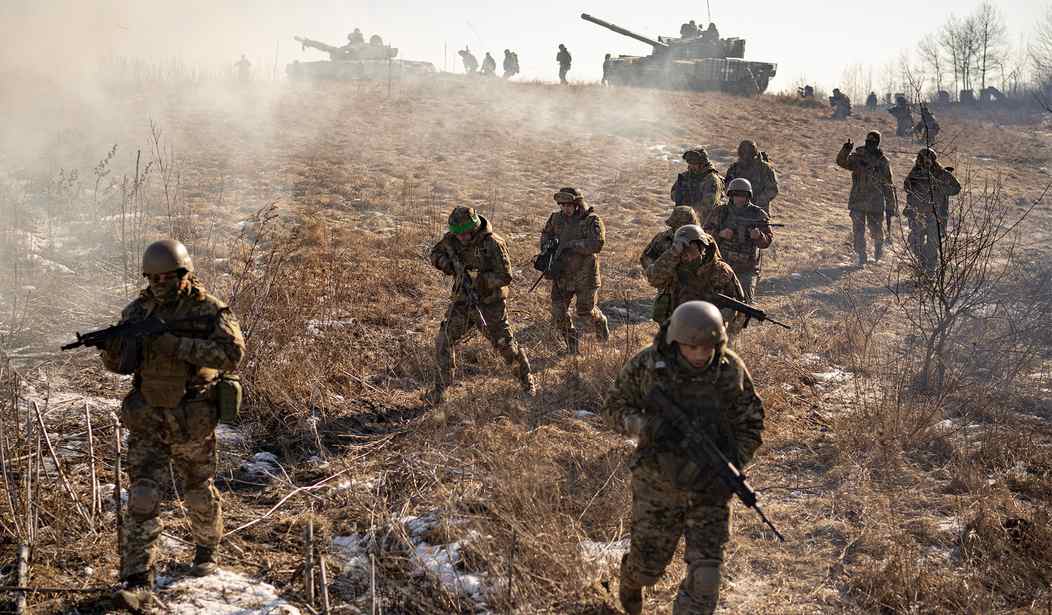As president of the United States, Donlad Trump will be handed a golden opportunity after he takes office to bring peace to Ukraine.
It won't be a peace that aligns entirely with U.S. interests. That ship sailed a year ago after Ukraine's summer offensive failed. The best that Ukrainian President Volodymyr Zelenskyy and his U.S. friends can hope for is a still-sovereign, smaller Ukraine that will be better able to withstand an attack by Russia.
It's believed Russia has a half million troops in Ukraine. They aren't going anywhere, and it's time that Zelenskyy comes to grips with that fact. The Ukrainian Armed Forces (AFU) does not have the numbers of troops or material to move Russia from the Donbas region in Eastern Ukraine.
Ukraine's "invasion" in the Kursk region is turning out to be a strategic disaster. Desperately needed troops earmarked for the Donbas battlefield that were diverted to the offensive briefly raised morale but achieved nothing significant.
Now, the Kursk salient is shrinking and the battle in Donbas is being slowly won by Russia. The grim reality for Zelenskyy is that the pace of Russian successes is picking up and he is going to be faced with the prospect of losing about 20% of his country unless he comes to the table.
After two years of saying that Ukraine will continue to fight until "every inch" of territory occupied by Russia is won back, he's going to have to accept Russian troops on Ukraine territory.
Trump's newly appointed Ukraine advisor is General Keith Kellogg, a non-nonsense soldier who has given a lot of thought to an endgame for the war. He wrote a research paper with former NSA chief of staff Fred Fleitz on Ukraine policy.
Kellogg, who served as national security adviser to former Vice President Mike Pence, co-authored a research report detailing his Ukraine policy proposal with former NSA chief of staff Fred Fleitz.
"The United States would continue to arm Ukraine and strengthen its defenses to ensure Russia will make no further advances and will not attack again after a cease-fire or peace agreement," Kellogg and Fleitz state in the plan.
But future U.S. military aid will require Ukraine to participate in peace talks with Russia, according to the report.
To convince Russian President Vladimir Putin to join peace talks, "President Biden and other NATO leaders should offer to put off NATO membership for Ukraine for an extended period in exchange for a comprehensive and verifiable peace deal with security guarantees," the pair wrote.
Dragging Zelenskyy to the negotiating table will be easy. Getting him to agree on ceding territory will be hard. But considering that morale in Ukraine among civilians is ebbing, it might be the perfect time to negotiate.
Russian President Vladimir Putin will also be a problem. Why should he stop fighting if he's about to achieve some of his military objectives in the next few months without giving anything away?
Denying Ukraine membership in NATO isn't much of a deal for Putin. He knows that there is considerable opposition in some NATO capitals due to the history of corruption and the tripwire that Ukraine would represent. Ukraine joining NATO is asking for a world war and most NATO members are shying away from that prospect.
Trump is not likely to cut off Ukraine from U.S. arms immediately. Besides, there is going to be about $6.5 billion in drawdown authority remaining from the last Congressional funding bill.
The administration still has more than $6.5 billion left in what is known as drawdown authority, which allows the Defense Department to transfer weapons and equipment to Ukraine from its own stocks, U.S. officials said. The Pentagon has reached the limit of the weapons it can send Ukraine each month without affecting its own fighting capability, however, and is facing logistical challenges in getting the arms to Kyiv’s forces, they said.
The U.S. would have to ship more than $110 million worth of weapons a day, or just shy of $3 billion in December and January, to spend the remaining funds in time. “I would say it’s impossible,” one congressional official said.
What Trump decides to do with the remaining money will have implications for the battlefield and could help determine how much leverage Kyiv has going into any potential peace negotiations with Russia. Trump has said he would end the war, and U.S. officials worry that his incoming administration could choose to withhold weapons to get Kyiv to the negotiating table.
“The Trump administration’s first order of business will be to decide what to do with remaining equipment and how best to pursue the next supplemental request to Congress," said Michael Kofman, a senior fellow at the Carnegie Endowment for International Peace. The remaining funds "offer the next administration considerable leverage to stop or suspend shipments to Ukraine," said Kofman.
That leverage is what Trump is counting on to bring Zelenskyy to the table. As for getting Putin on board for a ceasefire deal, it may be easier than many analysts believe. That's because Putin may have no intention of being constrained by any deal.
"It is vital to appreciate that Russian goals may expand with success, and given that the Kremlin has violated almost all significant agreements both with Ukraine and NATO, there is no assurance that even if Russia got what it wanted out of negotiations it would not subsequently endeavour to physically occupy the rest of Ukraine or be emboldened to use force elsewhere," write Dr Jack Watling and Nick Reynolds of the Royal United Services Institute (RUSI).
If Trump were to act on the basis that Putin was going to renege on the ceasefire deal, no deal would be possible. The best course of action would be to lean on our NATO allies to pony up and do a lot more for Ukraine's defense either by giving cash or, better, helping Ukraine build up its own arms industry to defend itself.










